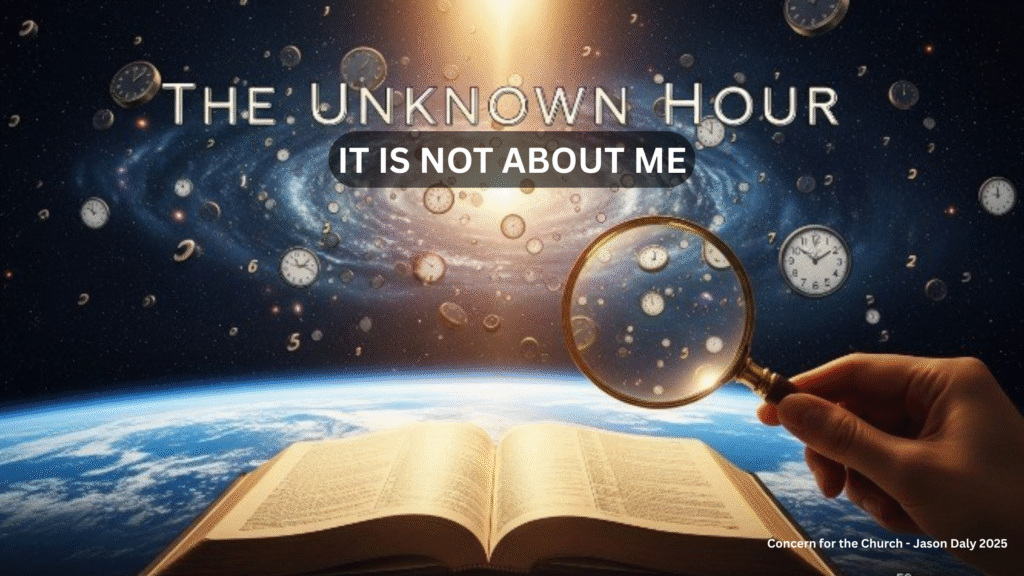
I never gave what Jesus said about his return much thought. I just believed he said what he said because he said it. Yet, after hearing about yet another interpretation of God’s word and His actual words—Jesus is God, right!—I thought I would put my mind to this one and see what I could come up with in support of Jesus actually telling it as it was.
In Mark 13:32, we read these very short and easy-to-understand words from Jesus: “But of that day or hour no one knows, not even the angels in heaven, nor the Son, but the Father alone.”
This is clear language. It communicates well the speaker’s thoughts and understanding of the matter at hand—His return. And yet, this verse presents a profound question about Jesus’ knowledge: If He is fully God, how could He genuinely not know the timing of His own return? Let’s delve into why Jesus knowledge in Mark 13:32 is such a pivotal and very important theological point, as viewing it incorrectly can cause significant problems in understanding who Jesus truly is. This immediate tension often leads to discussions about the nature of Christ’s divinity and humanity.
The “New View”: Jesus Knew, But Was Not to Reveal
Recently, a “newer view” has gained traction, attempting to reconcile this perceived tension regarding Christ’s omniscience. This interpretation suggests that when Jesus said “no one knows… nor the Son,” He didn’t mean He genuinely lacked knowledge. Instead, proponents argue that the Greek word for “know” (oiden) can, in certain contexts, carry a declarative or causative sense, meaning “to make known” or “to reveal.”
Therefore, according to this view, Jesus did know the hour of His return in His divine nature, but it was not His prerogative or mission at that time to make it known to humanity. This interpretation aims to safeguard Christ’s omniscience, placing the authority for revealing the timing solely with the Father. I likened this way of thinking to a military leader who knows the invasion date but is not authorized to reveal it to the lower ranks. This perspective aims to address the complexity of Jesus’ knowledge in Mark 13:32 without suggesting any limitation to His divine attributes.
My Challenge: Why This View Doesn’t Fully Convince Me
While this “declarative” interpretation is an interesting angle, and I appreciate its attempt to resolve a theological puzzle, I find myself not fully convinced. My primary reasons stem from both the practical implications for the Church and, more importantly, the very character of Jesus Himself.
1. The Purpose of Faith and Preparedness
If Jesus knew the exact time of His return, and simply chose not to reveal it, the impact on the Church throughout history would be profoundly different. Consider the following:
- Undermining Vigilance: The consistent New Testament call is to “watch,” “be ready,” and “abide in Him,” because His return is sudden and unexpected. If a date were known, even if unrevealed, it fundamentally changes the nature of our preparedness. Why be constantly vigilant if the date, though unstated, is fixed in divine knowledge for, say, another 500 years?
- Preventing Date-Setting: For nearly 2,000 years, believers have lived in the tension of an “any moment” return. This uncertainty fuels a vital reliance on Christ alone and an ongoing readiness. A known date, even if undisclosed, opens the door to unhealthy speculation and reliance on a calendar rather than a living faith. The very purpose of an unknown hour, and therefore a true lack of Jesus’ knowledge of it in His human mind, is to foster continuous faithfulness, regardless of the generation.
The uncertainty of the hour is not a flaw; it’s a feature of God’s design for His Church, driving us to live in expectant obedience and to prioritize the Kingdom.
2. The Unblemished Truthfulness of Jesus
This is, for me, the most significant hurdle for the “declarative” view concerning Jesus’ knowledge in Mark 13:32. Jesus is the embodiment of truth (John 14:6). He is perfect, sinless, and entirely without deception.
If Jesus did know the day and hour, but stated, “no one knows… not even the Son,” then His words would, by definition, be a strategic withholding of truth, bordering on dissimulation. This contradicts everything we know about His character. The Son of God, who never lied and was never tempted to hide the truth, would not utter a statement that implies a lack of knowledge if He possessed it.
God’s Word can be trusted to mean what it says. If Jesus said He didn’t know, then in the context of His human awareness and earthly ministry, He genuinely did not know. To suggest otherwise, even to protect His omniscience, risks impugning His perfect honesty.
Embracing the Mystery of the Incarnation
For me, the understanding that Jesus, in His genuine humanity, willingly limited His knowledge as part of His self-emptying kenosis, as seen in Philippians 2:7 is far more profound and consistent with the whole counsel of Scripture. It doesn’t diminish His deity but magnifies the incredible reality of the Hypostatic Union Christ’s Natures —that the fully God Son truly became fully man, embracing genuine human limitations for our salvation. This view of Jesus’ knowledge strengthens our appreciation for His incarnation.

